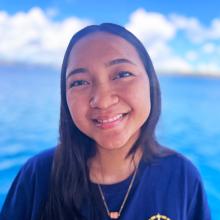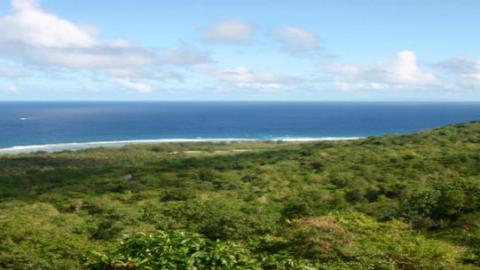
Ale'a Duenas
Tell us about your work/ research. What kinds of things do you do?
For this upcoming trip, I’ll be serving as a permit monitor aboard the Exploration Vessel Nautilus during its expedition to the Mariana Trench. My role will involve ensuring that the research team complies with all permit guidelines, verifying that proper protocols are followed, samples are collected responsibly, and no restricted materials are disturbed or removed. I’ll be helping to ensure that the scientific work is conducted ethically and in line with environmental regulations.
In previous research experiences, I’ve worked under the NSF INCLUDES and EPSCoR programs. With Dr. Brett Taylor, my project focused on fish population dynamics, specifically comparing species abundance and size distribution inside and outside marine protected areas in Guam. This work helped provide insight into how conservation zones affect reef fish communities. More recently, under Dr. Bastian Bentlage and the EPSCoR Student Research Experience, I’ve been studying the effects of heat stress on Acropora coral species. This involved using fluorometry techniques to measure chlorophyll-a fluorescence, which tells us about the health and thermal tolerance of the algae living within corals.
These opportunities have strengthened my research skills while deepening my commitment to marine conservation in the Mariana Islands.
What sparked your initial interest in your career?
Growing up in Saipan, I was always surrounded by the ocean, and from a young age I developed a deep appreciation for the marine environment. At first, I wanted to become a teacher, but over time I realized I wanted to do more to protect the environment that shaped my upbringing. My interest in marine biology really solidified when I got involved in programs like the Micronesia Challenge and later the NSF INCLUDES and EPSCoR research experiences. These opportunities helped me see how science and conservation could work hand in hand to support island communities like mine. I became especially interested in understanding how marine ecosystems respond to environmental stressors and how we can use research to inform sustainable management and conservation strategies.
Who influenced you or encouraged you the most?
The person who influenced and encouraged me the most is my sister, Anela Duenas. She graduated with a bachelor’s degree in Integrative Biology from the University of Guam and is currently in the Marine Biology graduate program there, preparing to defend her thesis this summer. Her journey has been incredibly inspiring, she started by working under Dave Benavente and interned at the Bureau of Environmental and Coastal Quality (BECQ) in Saipan before moving to Guam. She later joined the NSF INCLUDES program under Dr. Bastian Bentlage, who is now her graduate advisor, and her research focuses on corals.
Watching Anela’s dedication and passion for marine science sparked my own interest in the field. She helped me gain a deeper understanding and love for the ocean and our natural resources. Seeing someone from the CNMI, just like me, doing such impactful work made me realize that I, too, could contribute to something bigger. Her path showed me that it’s possible to pursue high-level science while staying connected to our islands. Now, she’s preparing to take the next step by pursuing a PhD in Marine Biology at the University of Hawai‘i at Mānoa—and that continues to motivate me every day.
What element of your work/ study do you think is the most fascinating?
One of the most fascinating things I’ve come across in my studies was something Dr. Brett Taylor shared with me about his work on fish otoliths. Although it wasn’t part of my own research, learning about how otoliths (these tiny structures in a fish’s inner ear) can be used to determine a fish’s age really sparked my curiosity. I was amazed that scientists can read the growth rings, almost like tree rings, to learn about a fish’s life history. That moment stuck with me and deepened my interest in fish biology. It made me realize how much there still is to discover about fish populations and how that kind of work is something I want to pursue in the future.
How did you get involved with Ocean Exploration Trust? How did you become part of the expedition team?
I got involved with Ocean Exploration Trust thanks to a referral from my sister, Anela Duenas. Jihan Younis originally reached out to her about the opportunity, but due to scheduling conflicts, Anela wasn’t able to participate. She shared the details with me instead and encouraged me to follow up. I reached out to Jihan and later connected with Sean Macduff, which eventually led to me joining the expedition team. I’m incredibly excited to be part of this experience. I see it as a rare and valuable opportunity to learn more about ocean exploration, deepen my knowledge of marine science, and connect with professionals doing cutting-edge work in the field.
What other jobs led you to your current career?
One of the earliest opportunities that led me toward my current path was being a Micronesia Challenge Young Champion. That experience really opened my eyes to the environmental challenges our islands face and the importance of community-based conservation. I worked closely with local organizations and community members, which helped me see how deeply connected our culture is to the ocean and natural resources. Later on, I had the chance to work under Dr. Brett Taylor, which gave me hands-on experience in marine science. Even just being around his research, especially his work with fish, helped me understand the bigger picture of why studying marine life matters. These experiences made me realize how much I want to focus on fisheries, not just from a scientific perspective, but also because of the cultural importance of fish in Chamorro and Hawaiian communities. It’s a way for me to give back, protect what matters to our people, and carry our values into the future of marine conservation.
What are your degrees and certifications?
CPR/AED Certified - April 2024
What are your hobbies?
I enjoy snorkeling during my free time and recently got into sewing although I'm not quite good at it yet. I also enjoy cooking and baking!
What advice would you give someone who wants to have a career like yours?
My biggest piece of advice is to always go for opportunities. Even if something only sounds a little interesting, apply anyway. You never know where an experience might lead or how it might help you grow. Every opportunity, big or small, can teach you something new about yourself, what you enjoy, and what kind of work you want to pursue. Also, don’t be afraid to reach out to people, ask questions, and put yourself out there. A lot of great opportunities come from simply taking that first step and making a connection.
Expeditions
Ale'a participated in the following Ocean Exploration Trust expeditions:

